one | two
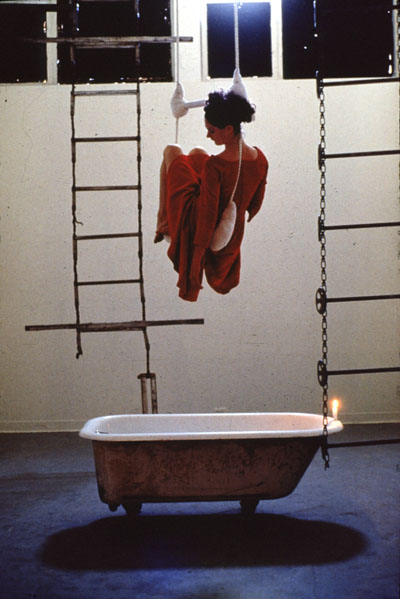
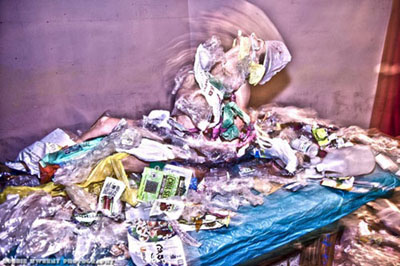
|
Back here in Oakland, California I'd
been virtually admiring Sénamé's work in poetry and architectural achievements while delving into a deep regard for sources and context
in my own work.
I'd been creating dance and performance works that rendered a more complete picture of the effects of socio-economic trends such as upward mobility,
trickle down effect and the ease at which apathy and irrisponsibility become when disguised by politically correct public forums.
My works became more radicle when it occurred to me that our bodies are the main nature resource in urban environments. I collaborated with other Artists
creating 'temporary autonomous zones' (inspired by Hakim Bey) where utter freedom from assimilation and control would create synergistic relationships
among *performers* and *viewers* in embodied rituals of extracting the primacy on a single means of exchange even if only for a moment
moving toward a deeper connection to self-agency and colaborative sufficiency.
Integral to this work has been a refusal to throw AWAY any plastic waste on and off for over twelve years and continually
for the passed five. Using my collection of plastic trash in performances has served as the literal *baggage*, directly
signifying at least a small part of a legacy I've inherited being born into capitalism and a global economy that has resulted in
a default disposable single-use culture, the detritus of which has imposed itself the world over. Not throwing plastic away has
been a direct-action upon my self: Taking stock of my waste as a way to inform my own consumption while taking responsibility
for that legacy in a major life style change to zero-waste; which my home has been for 5 years now.
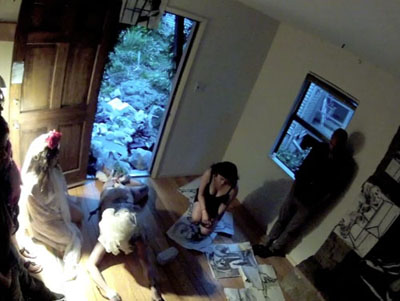
|
|
Between my weak French and lack of means to travel to Togo I had lost track of the residencies Sénamé had invited me to participate in
and the many projects and groups he invited me to "like" on social networks over the years. Most noteably the
engineering of the first 3D printing machine ever produced
in Africa out of plastic e-waste found right there in Togo–the premier hi/low tech project to emerge from his new program, WoeLab, based in Lomé", Togo.
But I did not understand where he was heading with it all. In the many images of him involved in internationally recognized engagements
and receiving awards, I did notice he began to look very tired and not well. That got my attention, so I tried to get his,
to no avail...
But Sénamé did connect me with this guy: |
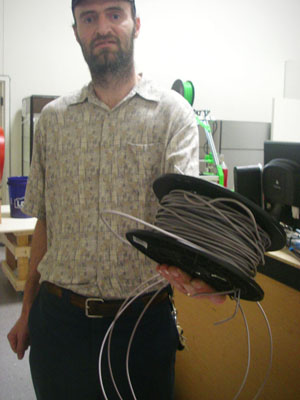
above: Michael Howland
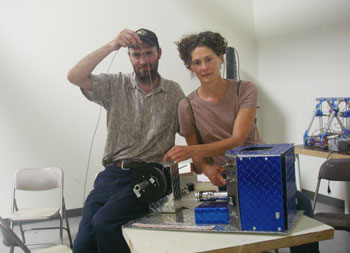
above: Michael Howland and Kyra Rice
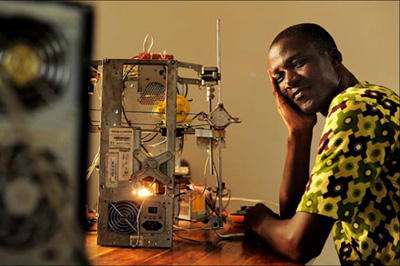
|
Within the last ten years Togo
and—to an even worse extent Togo's neighboring country—Ghana, have become the world's largest e-waste dump sites.
See:
Agbogbloshie:
the world's largest e-waste dump
Dude with the 3D filament in his hand is Michael Howland who lives right here in San Leandro and started project OmNom: "an all-in-one 3D Print
& Plastic Recycler/Filament Maker that is being designed to take failed, worn out & scrap 3D printed parts
[and other plastic waste] and turn this otherwise unusable material right back into filament again."
www.omnomproject.com
From my perspective I thought this is it!! this little machine is going to solve the world's or at least Togo's plastic waste crisis!!
While it has potential to make a dent in it, I was just so thrilled to know someone who could actually do something
beneficial with all or at least some of my plastic collection.
After my visit to Michael Howland's shop I reported back to Sénamé my excitement and asked how I could assist in the many obsticals that
seem to be keeping Michael's brilliant project from reaching Togo. Sénamé's response? The machine is not necessary.
"For the moment he just need to come to Lomé" (where WoeLab is located). I didn't quite get it at first, why had Sénamé even introduced me to this guy? To deal with my own plastic pile?
Perhaps. But with a little research and, thanks to a couple of key interviews with Sénamé in English, I began to understand that for the last several
years he had been committing his sublime radical genius in design and human understanding (he is also an anthroplologist) and
every drop of his personal energy
responding to and engaging the context and circumstances of the people in Togo.
What Sénamé and his collaborators are
actually achieving is a discrete but intensely radical shift away from a primacy on MONEY or any thing not derived from thier context as a sustainable
solution.
Sénamé and his colaborators are creating 'maker-spaces' that generate ideas-sharing with hacker ethics and traditional
know-how, making use of the materials at hand to resolve issues specific to thier context. They are coming up with solutions to questions like: How could a
machine be made out of the local know-how and material resources (and waste) they have right there in Togo that here in the west requires a $6000 CAD software
application and an industrial plasma cutter among other things?
Context driven solutions
From an interview of Sénamé with SiloconAfrica.com:
Democracy of Technology: Make Everybody Equal in Front of New Technologies
Interviewer: Obviously you need support and additional tools and equipment for the center, what are your current needs and how could our readers help you?
Sénamé: We do not have the same resources as other african FabLab witch are directly under the MIT Labs Initiative or other Western networks initiatives.
And to be faithful to the hacker ethic, we have chosen so far not to introduce funding requests to public institutions or big groups. So we fund
our space trough spontaneous acts of solidarity and donations...We collect all kinds of tools and materials that can still be used. And we are
mainly asking for new projects and are paying attention to all kind of collaboration proposals with other HackerSpaces or Fablabs in the world.
We also offer our know-how and lessons learned to any Makerspace which would arrive in Togo."
Apparently, they don't need outside support, tools and equipment for the center. However they welcome any minds that would like to share ideas in this
radical maker-space as it is a brilliant modle for context driven solutions, and a movement that could potentially serve any place in the world.
A whole series of performance/ritual/direct action events I was involved in were inspired by the reading of Hannah Arendt's On Revolution
as well as the inefficacy of the #Occupy movement here in the U.S. It is clear that most revolutions throughout history end in tyranny because nothing is set
in place after the coupe. The fall out of violent uprising then a repetition of the same systems only with different faces seem to be what consistently
follow most revolutions, only they are increasingly becoming more and more violent and destructive. In my own small ways I have been creating another more sustainable,
generative reality through Art, direct action and life style changes from which to live;
increasingly more and more removed from the distructive winds of this era. Things like building good soil, modeling a zero-waste life style, teaching children
how to grow organic food, creating Artworks that those who come after me may build greater self agency from until these destructive winds finally die out.
I have the privilege to fantasize on land projects and food gardens that seem discrete from 'the system' yet feel ineffective in my
efforts on a scale that others actually recognize. Except Sénamé.
What I am learning is that the distructive winds are escapable by none, not the privleged, and no matter how 'discrete' or marginalized, and that it will take a new kind of effort to evolve
from within them. The projects Sénamé has been giving his life
blood to are not an escape, nor are they efforts to beat the system from within. The Togolese have no choice but to be immerssed in the detritus of the system.
Nor are they actions against anything. Instead they are creating their own system in the face of the winds that dump and destroy, rape and lay waste.
New systems that are self sustaining, generative, open source, based on sharing and making, with recognition of tradition and new technology, honoring of
context and the very things needed for life. In an era of a destructive momentum the world has never seen, Sénamé and the colaborators at WoeLab present a radical
generative model for us all. It is the living example of an ever complex and deep Intimacy of Place.
|
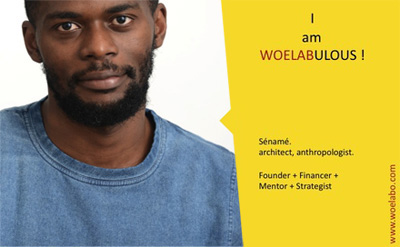
'faire avec de petits moyens de grandes chases'
www.woelabo.com
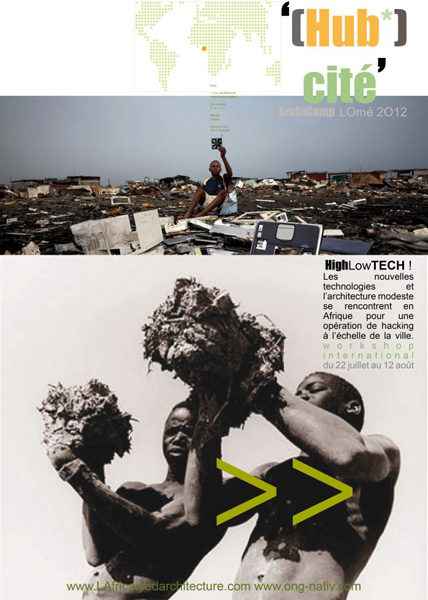
www.lafricainedarchitecture.com
#intimacyofplace, intimacy of place, intimacyofplace, #intimacyofplace
|
|
|
